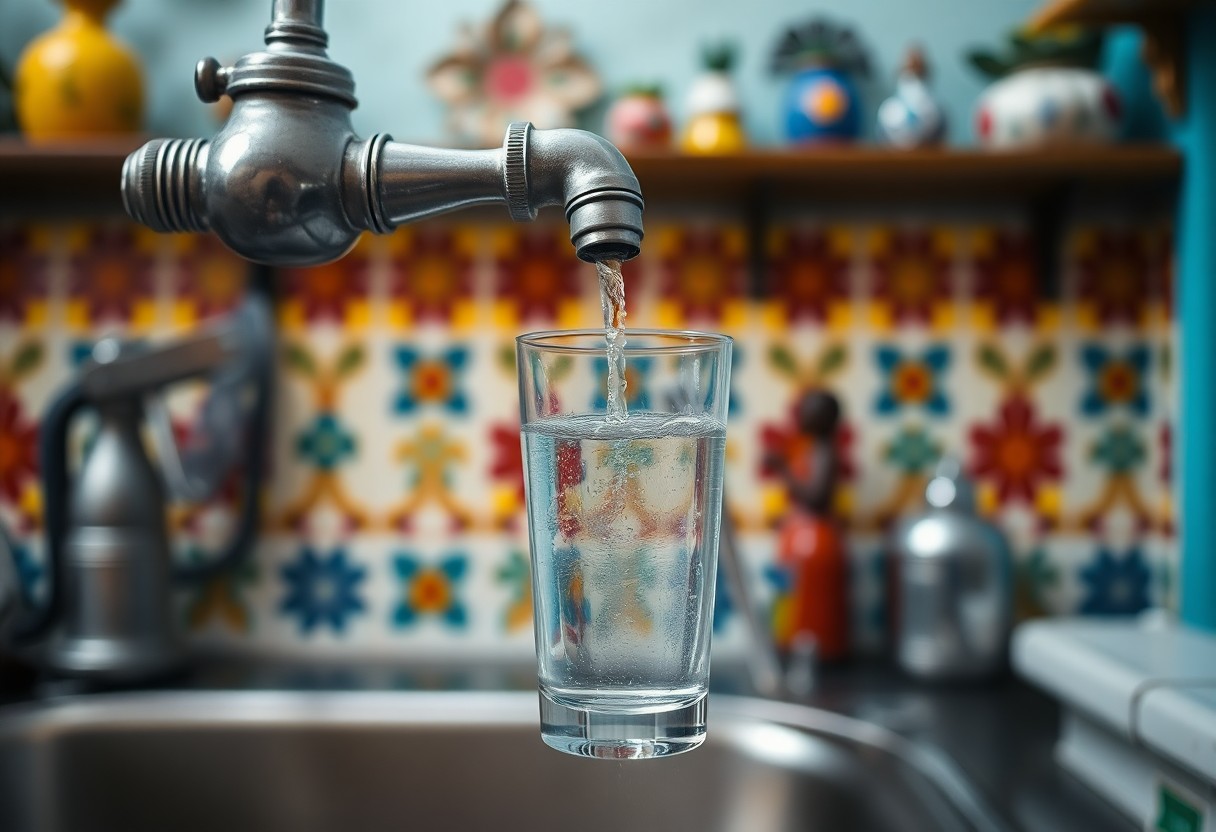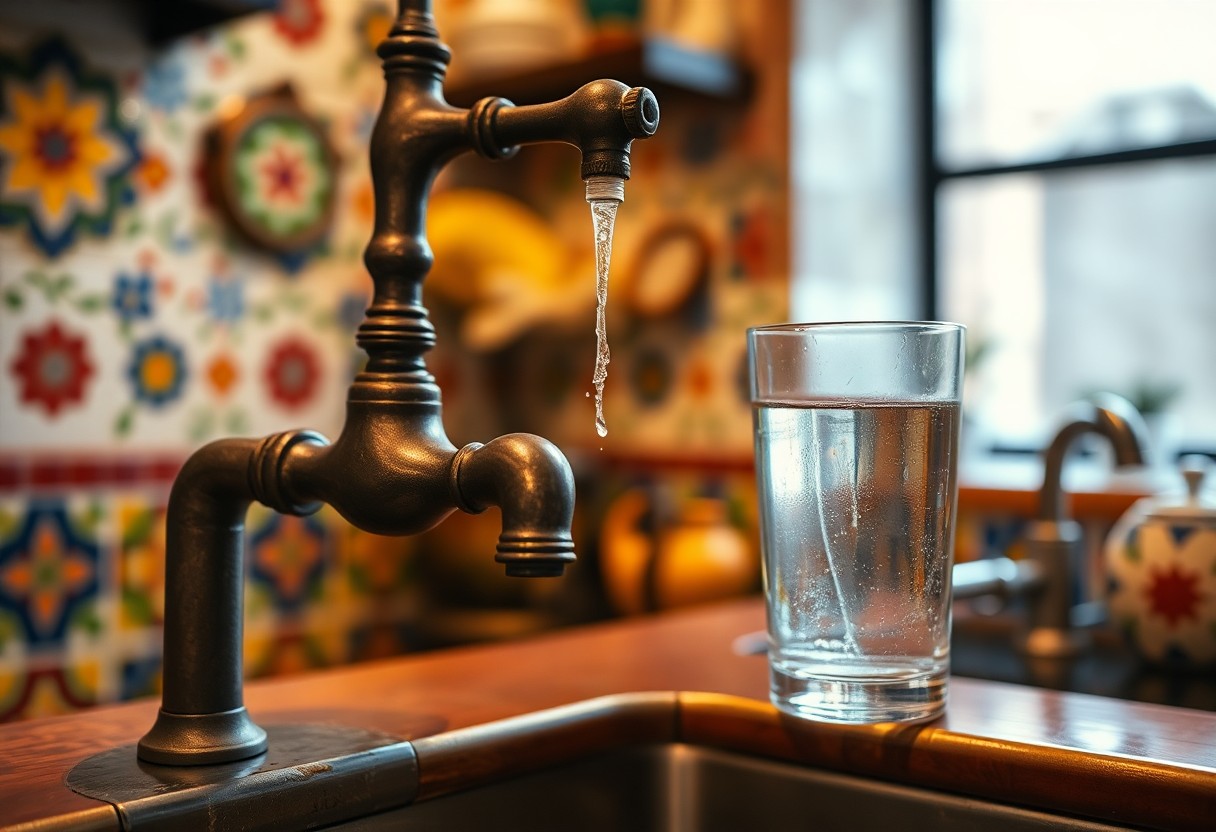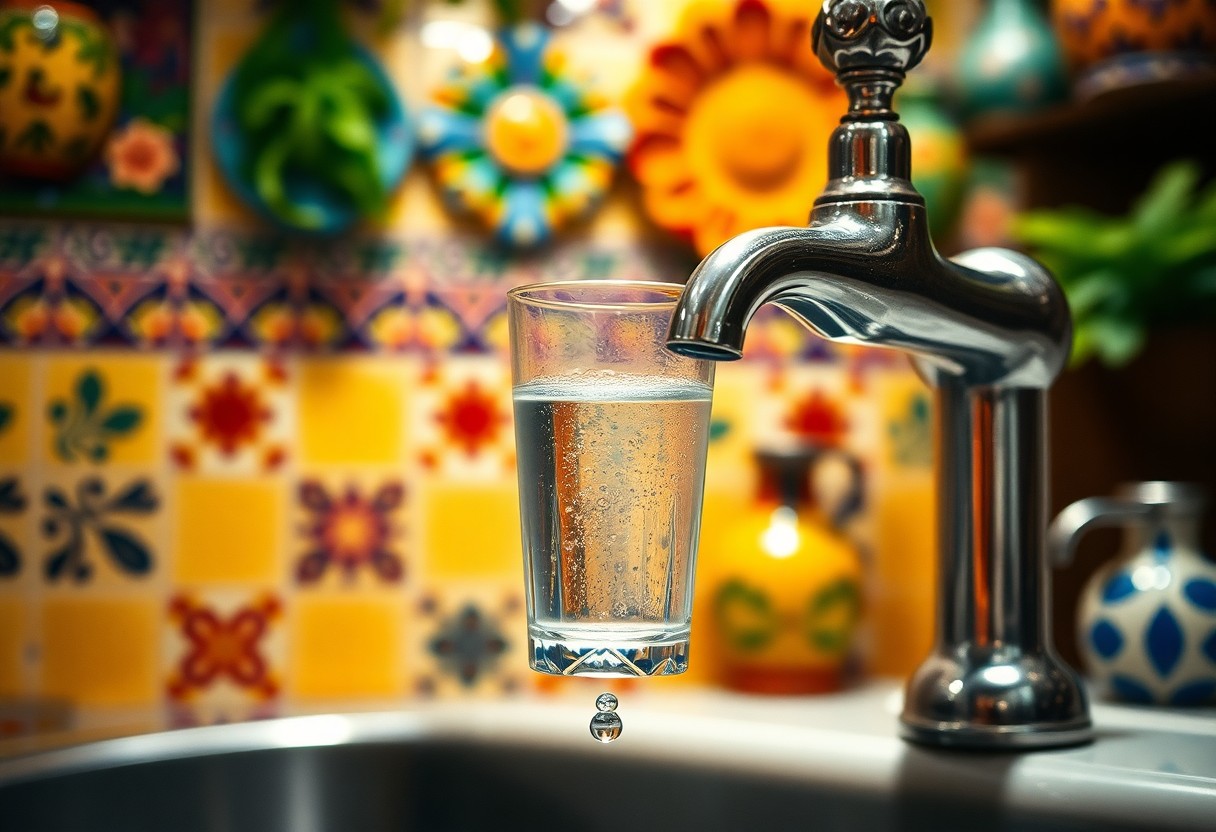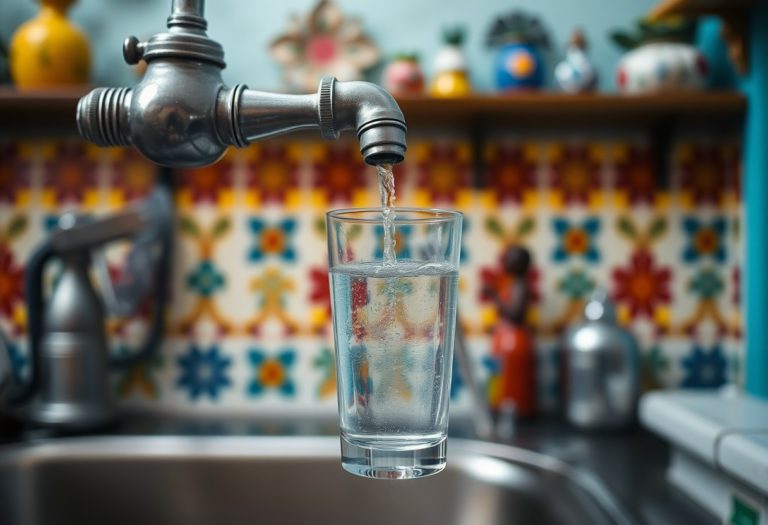If you’re planning a visit to San Miguel de Allende, a stunning colonial city in Mexico, you may have concerns about water safety. While the area’s tap water is treated, it is not recommended for direct consumption by travelers. To safeguard your health and comfort, it’s wise to rely on bottled water, use filtered water for brushing your teeth, and remain cautious with ice cubes and any raw produce. The health risks tied to drinking untreated water include bacteria that could lead to traveler’s diarrhea or other gastrointestinal issues. By following these straightforward yet vital precautions, you can thoroughly enjoy your time in this breathtaking destination without compromising your health and well-being.

Comprehend and Tackle Water Safety Challenges in San Miguel de Allende
Before embarking on your adventure to San Miguel de Allende, it is essential to grasp the intricate landscape of water safety in the region. The tap water in this historic city is often deemed unsafe for drinking. Your health relies on making well-informed choices about water sources, comprehending local infrastructure, and adopting preventive measures. Although improvements have been implemented in the city’s water treatment systems, travelers must remain vigilant regarding potential contaminants and the aging pipeline infrastructure that poses significant health risks.
Thorough Examination of Water Quality in San Miguel de Allende
As you prepare for your journey to San Miguel, it’s crucial to familiarize yourself with the challenges related to water quality in the area. The municipal water systems frequently contain bacteria, parasites, and other microorganisms that can lead to serious digestive problems. Your safety hinges on understanding local water treatment protocols and recognizing that water quality can vary substantially across different neighborhoods within the city.
Stay Educated About Common Waterborne Illnesses in Mexico
Acknowledging the potential health risks associated with waterborne illnesses prevalent in Mexico is vital. Travelers often face conditions such as traveler’s diarrhea, hepatitis A, and typhoid due to consuming untreated water. These health issues can swiftly derail your travel plans and may necessitate immediate medical care.
Mexico grapples with considerable challenges concerning waterborne diseases, primarily due to inconsistent water treatment systems. Parasitic infections like giardiasis and cryptosporidiosis are particularly prevalent. Both rural and urban areas exhibit varying levels of water contamination, with children and travelers being the most susceptible to these health threats.
How Tourism Elevates Awareness and Safety in Water Management
Tourism practices significantly influence the awareness of water safety in San Miguel de Allende. Informed travelers can advocate for better water management practices by opting for bottled water, employing water purification methods, and supporting improvements to local infrastructure.
The tourism sector in San Miguel plays a crucial role in fostering water safety education. Travelers who raise awareness about water treatment technologies and hygiene practices contribute to long-term health improvements within the community. By sharing valuable insights and supporting local initiatives, you can help elevate water quality standards, ultimately benefiting both visitors and residents alike.
Assessing the Safety of Tap Water in San Miguel de Allende
Evaluating the safety of tap water in San Miguel de Allende requires careful consideration. The municipal water system presents potential health risks that travelers need to be mindful of. While basic infrastructure exists, water quality can vary dramatically among different neighborhoods, potentially exposing you to harmful contaminants such as bacteria and parasites. Taking necessary precautions to protect your health during your visit is the most prudent course of action.
Local Health Authorities’ Recommendations on Tap Water Usage
Local health departments provide official guidance suggesting that tap water should be treated before consumption. Their recommendations emphasize the importance of boiling water for at least one minute or using dependable purification methods. Consistently, these official sources advise both tourists and residents to remain cautious when utilizing municipal water supplies to avoid health risks.
Grasping the Realities of Tap Water Safety in the Local Context
Due to aging infrastructure and inconsistent water treatment processes, the water system in San Miguel de Allende presents numerous challenges. The quality of water can vary significantly based on your specific location. Factors such as the condition of pipes, the efficiency of treatment facilities, and local environmental conditions directly influence water safety.
To ensure access to safe drinking water, it’s vital to have a comprehensive understanding of local conditions. Your potential exposure to waterborne pathogens is influenced by several interconnected factors. Municipal water treatment facilities in San Miguel encounter difficulties in maintaining consistent purification standards, leading to dramatic fluctuations in water quality across different areas of the city.
Insights from Locals and Expats on Tap Water Experiences
Feedback from residents offers mixed reviews regarding tap water safety. Recommendations can range from complete avoidance to selective use. Many long-term expatriates and locals advocate for using filtered or bottled water as a precautionary standard.
Consequently, personal experiences unveil the complex nature of water safety. You may find that certain neighborhoods have more reliable water systems than others. Experienced residents often invest in sophisticated filtration systems or rely on bottled water delivery services to minimize potential health risks linked to municipal water supplies.
Exploring Bottled Water and Filtration Solutions
Ensure safe drinking water during your stay in San Miguel de Allende by exploring various hydration options. Numerous strategies exist to help you maintain your health, including purchasing bottled water and utilizing home filtration systems. Understanding reliable water sources is essential for preventing health risks, so being informed will aid you in making wise decisions about your water consumption.
Top Bottled Water Brands Worth Considering
As a traveler in San Miguel de Allende, you’ll encounter several reputable bottled water brands such as Bonafont, Ciel, and Pureza. These products can be conveniently found in local shops, supermarkets, and convenience stores. These brands adhere to strict quality control measures, ensuring safe drinking water for you throughout your visit.
Understanding Home Filtration Systems: Essential Considerations for Travelers
When it comes to home filtration, you have several options for effectively purifying water. Reverse osmosis systems and ceramic filters are popular choices among travelers and residents in San Miguel de Allende. These systems can eliminate harmful contaminants, providing clean drinking water directly from your tap.
Gaining a comprehensive understanding of home filtration technologies is essential. Factors such as filter lifespan, maintenance needs, and effectiveness against local water contaminants are vital considerations. Professional installation can help ensure optimal functionality and water quality within your living space.
Cost Analysis: Bottled Water vs. Home Filtration Systems
When evaluating filtration options, it’s crucial to consider the economic aspects of your water consumption. Here’s a comparative breakdown of costs:
| Water Source | Estimated Monthly Cost |
|---|---|
| Bottled Water | $30-$50 |
| Home Filtration | $10-$25 |
This detailed cost analysis reveals that home filtration systems can lead to substantial savings over time. Not only will you reduce costs, but you will also minimize plastic waste, making this an environmentally friendly choice for your hydration needs in San Miguel de Allende.
Ice Safety and Culinary Considerations for Travelers
Water safety in San Miguel de Allende encompasses more than just direct drinking. When dining out, it’s crucial to remain aware of potential water-related risks that could impact both your dining experience and health.
Understanding Ice Safety in Restaurants and Cafés
Behind the refreshing facade of drinks, ice can pose hidden health risks. Many restaurants in San Miguel utilize purified or filtered water for ice production; however, it’s always wise to ask about their water source to ensure your safety.
Food Preparation Practices: The Importance of Using Quality Water
When dining in San Miguel, the quality of water used for food preparation is a critical health consideration. Reputable kitchens typically employ purified water for washing produce, cooking, and general food preparation to mitigate contamination risks.
Thus, most reputable restaurants in San Miguel de Allende adhere to strict hygiene protocols. High-end establishments and those catering to tourists are particularly diligent about water quality, utilizing advanced filtration systems and ensuring that all ingredients are meticulously cleaned with safe water.
Effective Strategies for Choosing Safe Dining Options
As you balance your desire to explore local cuisine with the need to maintain your health, several strategies can be beneficial. Seek out restaurants with solid reputations, observe their cleanliness practices, and don’t hesitate to inquire about their food and water preparation methods.
To minimize potential health risks, prioritize dining at well-established restaurants that come highly recommended by locals or trusted travel guides. Choose cooked foods over raw preparations, and favor establishments that visibly demonstrate their commitment to maintaining high hygiene and water safety standards.
Here’s the content for the specified sections:
Comparative Analysis of Water Quality: San Miguel de Allende vs. Other Major Mexican Cities
To fully understand the water quality in San Miguel de Allende, consider comparing it with other major Mexican cities. The table below provides a detailed overview:
| City | Water Quality Rating |
|---|---|
| San Miguel de Allende | Moderate (Caution Advised) |
| Mexico City | Low Quality |
| Guadalajara | Moderate Quality |
Comparative Insights: San Miguel de Allende in Context with Mexico City and Guadalajara
When compared to other prominent cities in Mexico, San Miguel de Allende presents a unique profile regarding water quality. The comparative table highlights significant differences:
| Parameter | Comparison Detail |
|---|---|
| Mineral Content | Higher in San Miguel |
| Contaminant Levels | Lower than Mexico City |
Insights from Other Popular Tourist Destinations in Mexico
Tourist destinations throughout Mexico offer a wide array of experiences concerning water quality. You’ll notice notable variations in municipal water treatment standards and infrastructure.
Comparative analyses indicate that tourist-heavy areas often invest more in water infrastructure. Locations like Cancun and Puerto Vallarta typically maintain higher water treatment standards, benefiting international visitors with more reliable water systems.
Valuable Lessons from Traveler Experiences Regarding Water Safety
Examining traveler experiences reveals diverse perceptions regarding water quality. It is crucial to approach local water consumption with informed caution.
Through personal travel narratives, you will learn that water safety is contingent on multiple factors. Local infrastructure, treatment processes, and regional geological conditions significantly influence water quality. Experienced travelers recommend relying on bottled water and portable filtration systems to mitigate potential health risks.

Understanding Local Regulations and Standards for Water Quality in San Miguel de Allende
The enforcement of water regulations in San Miguel de Allende is inconsistent. Local municipal authorities have established guidelines for water management; however, their implementation varies across districts. Compliance levels depend on various factors, including the age of infrastructure and the local government’s investment in water treatment systems.
Government Initiatives Aimed at Enhancing Water Quality
In addition to ongoing infrastructure enhancements, the government of San Miguel has made significant investments in water treatment technologies. Their commitment is evident through regular water quality testing and gradual improvements in municipal systems. Their strategies aim to reduce contamination risks and enhance overall water safety for both residents and visitors.
Compliance Standards for Restaurants and Local Food Businesses
Quality control measures for food establishments in San Miguel are stringent. Health departments require routine water testing and filtration protocols for restaurants, cafés, and food service providers. You can anticipate that these venues adhere to strict guidelines to ensure customer safety and maintain high hygiene standards.
Understanding compliance standards necessitates familiarity with comprehensive health regulations. Restaurants are mandated to provide regular water quality documentation, including bacterial testing, filtration system maintenance, and adherence to national health codes. You’ll find that establishments undergo periodic inspections to verify their compliance with water safety protocols.
The Historical Context of Water Quality in San Miguel de Allende
By exploring the historical development of water infrastructure in San Miguel, you’ll uncover significant advancements in water management. Over the years, colonial-era water systems have been modernized, addressing historical issues related to contamination and limited treatment capabilities.
The evolution of water quality reflects broader urban development trends. Infrastructure investments have significantly improved water safety over the years, with technological advancements and increased governmental oversight playing crucial roles. You can trace the transition from rudimentary systems to more sophisticated, regulated networks.
The Role of Local Organizations and NGOs in Promoting Water Safety
Local organizations in San Miguel de Allende are vital in tackling water safety and quality challenges. Community-driven initiatives work tirelessly to improve infrastructure, water treatment systems, and public health standards. These groups collaborate with municipal authorities to implement sustainable solutions that protect both residents and visitors from potential waterborne risks.
Community Projects Aimed at Water Safety Initiatives
NGOs in San Miguel de Allende have launched targeted projects that address water contamination prevention. They conduct regular water quality testing, support infrastructure improvements, and engage with local communities to enhance water safety protocols. Their grassroots approach ensures thorough monitoring and strategic interventions.
Collaborative Efforts with International Agencies to Enhance Water Management
Behind the scenes, local water safety organizations partner with international health and environmental agencies. These collaborations bring expert knowledge and invaluable resources to San Miguel, facilitating advanced water treatment and monitoring techniques.
Given the complexities of water management, these international partnerships provide technical assistance, funding, and sophisticated scientific insights. They contribute to the development of comprehensive strategies for water purification, infrastructure upgrades, and long-term sustainability efforts in San Miguel de Allende.
Educating Residents and Tourists on Proper Water Consumption Practices
At the heart of every successful water safety initiative lies effective education. Local organizations create extensive awareness programs that inform both residents and tourists about best practices for water consumption and potential health risks.
International health organizations and local groups collaborate to produce multilingual educational materials. These resources offer in-depth guidance on water safety, filtration techniques, and preventive health measures, ensuring you are equipped to make informed decisions regarding water consumption during your stay in San Miguel de Allende.

Steps for Testing Water Quality in Your Home
Despite the importance of water safety, there are proactive measures you can take to evaluate your water quality while in San Miguel de Allende. Home testing provides an initial assessment for potential contaminants, helping you understand the safety of the water you are consuming. By employing various methods, you can gain valuable insights into your water quality before seeking professional analysis.
DIY Water Quality Testing Kits: A Practical Approach for Travelers
Water testing kits available at local pharmacies or online can assist you in quickly assessing your water quality. These affordable tools detect common contaminants such as bacteria, lead, and chlorine. You’ll typically find straightforward strip-based tests or digital meters that provide rapid results, enabling you to make timely decisions concerning your water consumption in San Miguel de Allende.
Professional Water Testing Services Offered in San Miguel
Local environmental health departments and specialized laboratories in San Miguel provide comprehensive water testing services. Professionals can conduct detailed analyses that extend beyond what home kits can detect, examining a wide array of potential water quality issues using advanced scientific equipment.
Consequently, professional water testing delivers a thorough evaluation of your water quality. Certified technicians employ sophisticated methods to identify microscopic contaminants, heavy metals, and other potential health risks that may not be detected through basic home testing. These services provide a comprehensive overview of your water’s safety, granting you peace of mind regarding your drinking water in San Miguel de Allende.
Interpreting Your Water Quality Test Results Effectively
Upon receiving your test results, understanding what the numbers signify is critical. Safe water parameters include specific acceptable ranges for various contaminants. Local health guidelines can assist you in determining whether your water meets the recommended safety standards.
Interpreting water test results requires careful analysis. Each parameter indicates a distinct potential health risk. Consult local health professionals or water quality experts in San Miguel de Allende to fully comprehend the implications of your specific test results, ensuring you take the necessary actions to safeguard your health.
Staying Hydrated: Alternative Sources of Water in San Miguel
After exploring tap water safety, you’ll want to discover alternative hydration options available in San Miguel de Allende. Bottled water remains your safest choice, readily available in most restaurants, stores, and from street vendors. Purified water dispensers (commonly referred to as “garrafones”) provide reliable drinking water that you can purchase from convenience stores and supermarkets. Consider carrying a reusable water bottle and refilling it from these trusted sources to fulfill your hydration needs while traveling.
Natural Water Sources: What to Avoid for Your Health
Water sourced from natural streams, rivers, or public fountains in San Miguel de Allende should be strictly avoided. These sources may harbor harmful bacteria, parasites, and contaminants that could lead to severe gastrointestinal complications. Always prioritize your health by verifying the origin of the water before consumption. Even seemingly clean natural water sources can pose significant risks to travelers unfamiliar with local environmental conditions.
The Health Benefits of Staying Properly Hydrated During Your Visit
It’s vital for any traveler in San Miguel de Allende to prioritize hydration. Proper hydration boosts your immune system, helps regulate body temperature, and ensures optimal physical and mental performance as you explore this enchanting city. Drinking sufficient water can help prevent fatigue, headaches, and sustain your overall wellness in the high-altitude environment.
Given San Miguel’s elevation of approximately 6,200 feet, your body requires more hydration than at sea level. The dry climate and increased altitude heighten water loss through respiration and perspiration. Maintaining proper fluid intake can help avert altitude-related symptoms like dizziness and shortness of breath. Staying well-hydrated allows your body to adapt more swiftly to the environment.
Understanding the Importance of Daily Water Intake for Optimal Health
In addition to preventing dehydration, adequate water consumption supports your digestive system and helps flush out toxins. In the warm climate of San Miguel, you’ll need to consume more water than you typically would at home. Aim for a daily intake of at least 8-10 glasses, adjusting based on your activity level and sun exposure.
Health experts suggest monitoring your hydration by observing urine color and frequency. Light-colored urine indicates proper hydration, while dark yellow suggests a need for increased water intake. Your hydration needs can vary based on factors such as physical activity, temperature, and individual metabolism. Be attentive to your body’s cues and drink water proactively, especially while navigating the charming streets and attractions of San Miguel de Allende.
Steps to Take If You Experience Illness During Your Trip
In the event of illness while in San Miguel de Allende, it’s crucial to act swiftly and strategically. Your health should be your top priority. If you notice symptoms indicative of waterborne illness, stop consuming local water immediately, switch to bottled water, and closely monitor your condition. Make sure to rest, avoid strenuous activities, and focus on recovery. Your body requires time to combat potential bacterial or parasitic infections that may have entered your system through contaminated water sources.
Identifying Symptoms of Waterborne Illness for Early Intervention
When you first notice signs of illness, be vigilant for specific symptoms. Severe diarrhea, persistent vomiting, abdominal cramps, and fever are prominent indicators of possible waterborne diseases. These symptoms may manifest within hours or days following exposure to contaminated water. Remain attentive to your body’s signals and keep track of the duration and intensity of your symptoms, as this information could be critical if you seek medical advice.
Effective Rehydration Solutions and Natural Remedies
Above all, preventing dehydration is of utmost importance. Oral rehydration solutions such as Pedialyte or homemade electrolyte mixtures can help replenish lost fluids and minerals. Aim to consume these solutions frequently in small doses, avoiding large quantities that may provoke further stomach distress. Stick to clear liquids and gradually reintroduce bland foods as your condition stabilizes.
Remember, hydration extends beyond merely drinking fluids. A strategic approach to replenishing electrolytes is essential. Consider using commercial rehydration packets specifically formulated for travelers, which contain accurate mineral balances. Many pharmacies in San Miguel de Allende carry these solutions, making them easily accessible. Refrain from consuming sugary beverages and alcohol, as they can exacerbate dehydration and complicate your recovery.
When to Seek Professional Medical Assistance During Your Stay
Recognizing when professional medical help is necessary can be crucial for your well-being. Persistent symptoms lasting more than 48-72 hours, signs of severe dehydration, or the presence of blood in your stool are clear indicators that immediate medical attention is required. Local clinics in San Miguel de Allende are equipped to handle traveler’s illnesses and can provide rapid, effective treatment.
Even minor symptoms can escalate quickly when abroad. A professional medical evaluation may uncover underlying conditions that require specialized attention. San Miguel de Allende has several reputable medical facilities with English-speaking staff who are experienced in addressing traveler’s health concerns. Do not hesitate to visit a clinic if your symptoms are severe or prolonged, as early intervention can prevent more serious health complications.
Packing Essentials for Your Trip: Must-Have Water Safety Items
Many travelers heading to San Miguel de Allende should prioritize water safety by packing essential items. Key items to include are water purification tools such as portable filters, purification tablets, and a reusable water bottle with built-in filtration. These items will not only help you stay hydrated but also protect your health while exploring this beautiful Mexican destination.
Recommended Products for Enhancing Travelers’ Water Safety
In addition to water safety gear, consider including UV water purifiers, filtered water bottles, and compact water treatment systems in your packing list. Brands like SteriPEN, LifeStraw, and Grayl water bottles are excellent options for travelers seeking reliable water purification solutions in San Miguel de Allende.
Personal Hygiene and Water Management Practices for Travelers
Water management is crucial when traveling in San Miguel de Allende. You should avoid using tap water for drinking, brushing teeth, and washing dishes. Opt for bottled or properly treated water to minimize health risks associated with local water contamination.
Personal water practices require careful attention during your stay in San Miguel de Allende. Remain vigilant about your water sources, ensuring you use sealed bottled water for all consumption. When dining out, request beverages without ice and verify the water used in food preparation.
Essential Guidelines for First-Time Visitors to San Miguel de Allende
First-time visitors to San Miguel de Allende should adhere to these critical water safety guidelines:
- Always consume bottled water
- Use sealed water bottles from reputable brands
- Check the integrity of the water seal before consuming
- Refrain from using ice in drinks
Any deviation from these guidelines could jeopardize your health.
Preparing for your trip necessitates understanding local water conditions. Consider these additional recommendations:
- Pack multiple water purification methods
- Research local water quality prior to arrival
- Carry extra water treatment supplies
- Consult travel health professionals for advice
Any proactive approach will enhance your travel safety.
Frequently Asked Questions About Drinking Water in San Miguel de Allende
For those visiting San Miguel de Allende, understanding water safety is essential. You’ll want to know specific details about drinking water to ensure a healthy and enjoyable trip. Common inquiries often pertain to tap water safety, bottled water availability, and potential health risks. Knowing the appropriate precautions can aid your navigation of hydration challenges and inform your decisions regarding water consumption during your stay.
Common Concerns Addressed for Visitors to San Miguel de Allende
The primary concerns for newcomers generally involve potential waterborne illnesses and the safety of local water sources. You may feel apprehensive about drinking tap water, using ice cubes, or consuming fresh produce washed in local water. Understanding municipal water treatment processes and recommended precautions can help minimize health risks, allowing you to enjoy your time in San Miguel de Allende with peace of mind.
Connecting with Local Experts for Guidance on Water Safety
Throughout your journey, seeking advice from local health professionals and seasoned expatriates can yield valuable insights into water safety. You’ll find that local knowledge is invaluable for understanding the intricate aspects of water consumption in San Miguel de Allende.
For example, engaging with local healthcare providers, expat community groups, and tourism offices can offer you current information. These sources can furnish specific recommendations regarding water filtration, safe drinking practices, and relevant health advisories that could influence your hydration strategies.
Resources for Further Information on Water Safety in San Miguel de Allende
Regarding water safety in San Miguel de Allende, you’ll discover a wealth of online and offline resources to keep you informed. Reliable websites, travel forums, and local health departments can provide comprehensive guidance on health precautions related to water.
Through thorough research, these resources offer detailed insights into water quality, treatment methods, and safety recommendations. You can access municipal water reports, expatriate forums, and travel health websites to obtain the most current information regarding drinking water in San Miguel de Allende.
The Impact of Climate on Water Safety in San Miguel de Allende
Additionally, climate plays a crucial role in determining water safety in San Miguel de Allende. You’ll find that local environmental conditions directly impact water quality and potential contamination risks. Understanding these dynamics is essential for making informed decisions about water consumption and protection during your visit to this historic city.
Seasonal Changes and Their Impact on Water Quality and Safety
Seasonal variations significantly influence water safety in San Miguel de Allende. During rainy periods, you may encounter increased runoff, which can introduce contaminants into water systems. Being aware of these seasonal changes can help you take the necessary precautions to maintain your health while enjoying this unique environment.
Drought Conditions and Their Effects on Water Quality Management
Moreover, drought conditions can profoundly impact water infrastructure in San Miguel de Allende. Water scarcity can hinder treatment processes and heighten the concentration of potential pollutants. Exercise caution during extended dry spells when water resources become limited.
This ongoing challenge in water management creates complex environmental issues. Municipal water systems often grapple with maintaining consistent quality during times of prolonged drought. You will find that water treatment facilities must adapt to reduced water volumes, which may increase the risk of contamination and diminish overall water safety standards.
Long-Term Environmental Challenges and Their Implications for Water Safety
For both visitors and residents, long-term environmental trends in San Miguel de Allende pose ongoing challenges for water safety. Climate change impacts on water resources and infrastructure necessitate continuous monitoring and adaptive strategies to ensure safe water consumption.
Beyond immediate concerns, San Miguel de Allende faces intricate long-term water management issues. Groundwater depletion and shifting precipitation patterns require sophisticated environmental strategies. It’s vital to remain informed about local water treatment developments and the potential risks associated with changing climate conditions in this historic region.
Key Takeaways for Maintaining Health in San Miguel de Allende
All travelers to San Miguel de Allende must prioritize their health through proactive measures and informed decisions. Opt for bottled or filtered water, avoid ice in beverages from street vendors, and exercise caution with street food to minimize health risks. Your best defense lies in preparation: pack a basic medical kit, consider travel insurance, and maintain awareness of your surroundings. Immerse yourself in the vibrant local culture while adhering to sensible health precautions. By following these guidelines, you can significantly reduce the chances of illness and ensure a memorable, safe experience in this beautiful Mexican destination.
The Article: Can You Drink the Water in San Miguel de Allende? Health & Safety Tips appeared first on https://fallinginlovewithsanmiguel.com/
The Article Drinking Water in San Miguel de Allende: Safety Tips Was Found On https://limitsofstrategy.com




